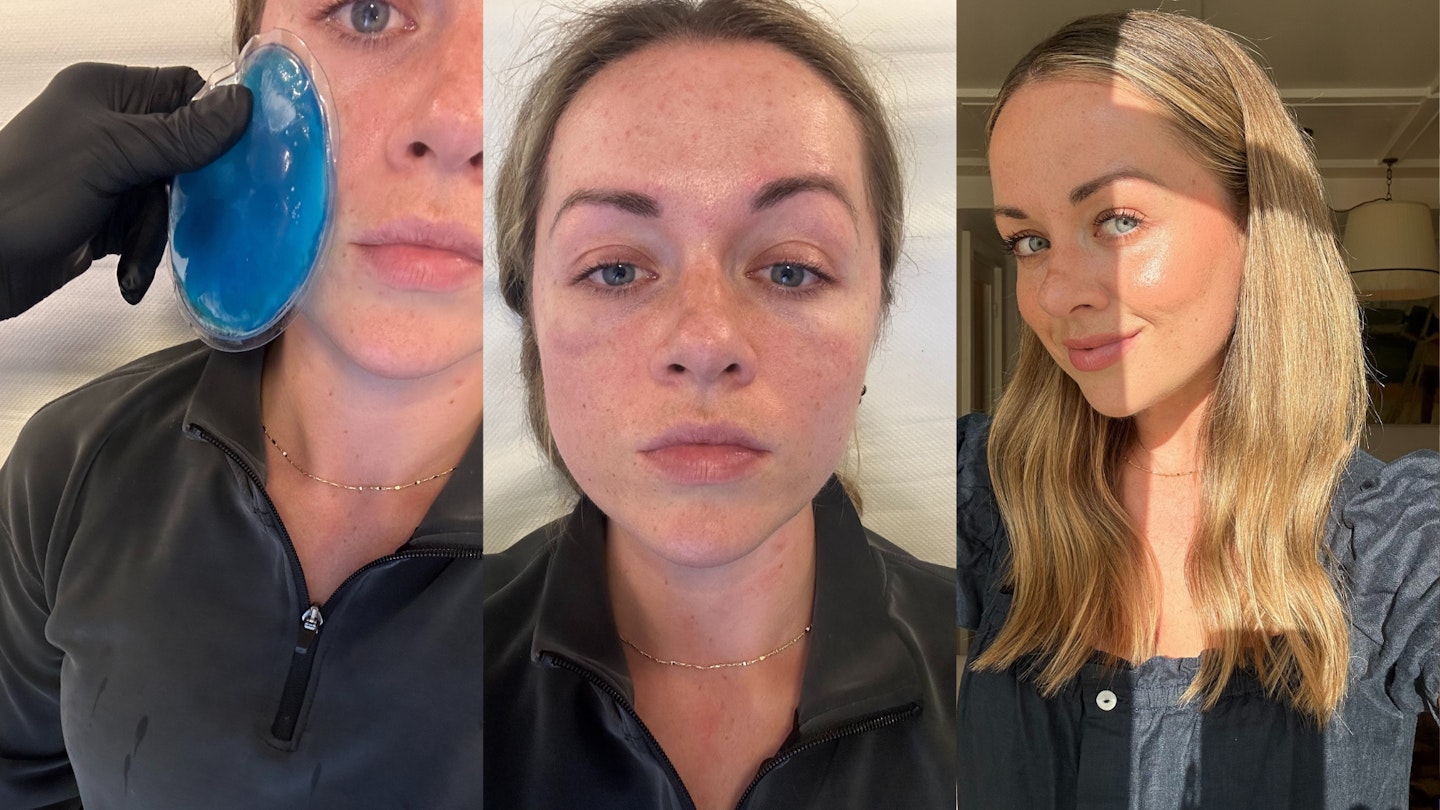It's a mid-summer morning and I'm at a press breakfast in The Langham hotel. It's an opulent affair - all crisp table cloths and polished silverware. The topic of the day feels considerably less glamorous, however. Because the industry are gathered here to chat sperm. Salmon sperm, specifically. Granted, it's not something that I'd previously given much thought to (you'll be relieved to know) but the incredible before and after photos being passed between the beauty journalists present have me intrigued.
Since entering my thirties, I've noticed a decided change in my complexion - under my eyes in particular. The area is duller, darker, and more sunken, taking on the kind of pallor that no amount of green-juice guzzling could possibly stave off. Which is why I find myself here, at The Langham, contemplating the possibility of injecting salmon sperm under my eyes in the name of beauty.
Otherwise known as polynucleotides, it's not a stretch to say it's the buzz word of the moment - there's been a mind-blowing 2446% increase in Google searches in the last few months alone.
'It is an incredibly exciting time in the aesthetic industry,' Dr. Ashwin Soni tells me on the day. 'The innovation behind polynucleotides is incredible. We have patients flying in from internationally for this treatment, so the buzz behind this is truly global!'
Here, Grazia have harnessed some time with Dr Soni to find out everything you need to know about injectable polynucleotides, from their skin boosting benefits to exactly how much they cost. And, having booked in for a salmon sperm treatment of my own, you can scroll on for my full review. If it's good enough for Kim Kardashian...
Meet The Expert

The aesthetics doctor of choice among beauty editors, Dr. Ashwin Soni MBBS, MD, BSc is a Plastic & Reconstructive Surgeon and the Founder & Owner of The Soni Clinic located in Ascot, Berkshire and a Residency in the Chuan Spa at The Langham London. He is highly experienced in both non-surgical and surgical aesthetic procedures, and prides himself on his 'in-depth understanding of total body and facial anatomy.'
What are polynucleotides?
Let's start with the basics. What are polynucleotides and what are their benefits?
'Polynucleotides are an injectable bio-stimulator that are often derived from salmon DNA but this can also be trout DNA,' explains Dr Soni. 'They are essentially DNA fragments that are extracted from the cells within salmon - typically the spermatozoa cells as they have the most pure proteins which are inactivated so it does not generate a response when injected. I personally use Ameela, which is a brand backed purely on science. They have different density products for the various areas of the face, neck and body.'
Dr Soni reveals how polynucleotides work to 'upregulate' our fibroblast cells - a type of cell that depletes as we age.
'Polynucleotides boost collagen and elastin, ultimately improving tissue regeneration and restoring skin tone and elasticity. The product will have an antioxidant and hydrating effect in addition to the bio-remodelling, and will therefore result in a skin that looks and feels healthier.'
What’s the difference between polynucleotides and and other skin boosting injectables?
Known for their skin brightening prowess, injectable boosters like Restylane Vital and Profhilo are still much requested in clinics the world over. But what is it that makes polynucleotides different?
'Skin boosters contain vitamins, minerals, antioxidants, hyaluronic acid, and sometimes amino acids in order to boost the quality of the skin and give that lovely glow that everyone wants,' explains Dr Soni. 'Polynucleotides differ because they work on a more on a cellular level within the skin.'
It's this cellular level of working that can benefit the appearance of facial ageing in a new and exciting way.
'Polynucleotides are working on a particular receptor within the skin that stimulates a chain of cellular pathways, which contributes to the increase in fibroblasts, which therefore increases the collagen and elastin. It will still give the hydration and glow, but really works on the ageing tissue in a wonderful way.'
Where can polynucleotides be injected?
'They can be used effectively under the eyes, for the face and neck, and even for the jawline and cheek bones,' says Dr Soni. 'Patients can expect an improvement in the youthful appearance of their skin. Due to the natural element of this treatment, and the fact that you can inject it into any type of anatomy, it means that almost anyone is a candidate.'
Process and Pain Levels
Dr Soni assures me that the procedure itself is a quick one, but adds that this often depends on the skill of the injector. I admit that I am nervous and that I've heard it's painful - but I also note that I don't have a particularly high pain tolerance. Read: I'm a massive baby. But I needn't have worried. Dr Soni applied a local anaesthetic cream, then held an ice pack to the area meaning I was numbed up by the time it came to administer the treatment. Where some practitioners will use a needle to inject lots of smaller doses under the eye, Dr Soni directs a blunt tipped cannula via a singular entry point. He tells me this is to minimise the chances of bruising and swelling. I feel the slightest nip when it pierces my skin, followed by a very minimal sting as the polynucleotides are injected and dispersed under my eyes. It's uncomfortable, yes, but this is mostly to do with the idea of the actual procedure as opposed to the actual feeling of it. It's certainly not pleasant - but it's not painful and the whole thing is over in minutes.
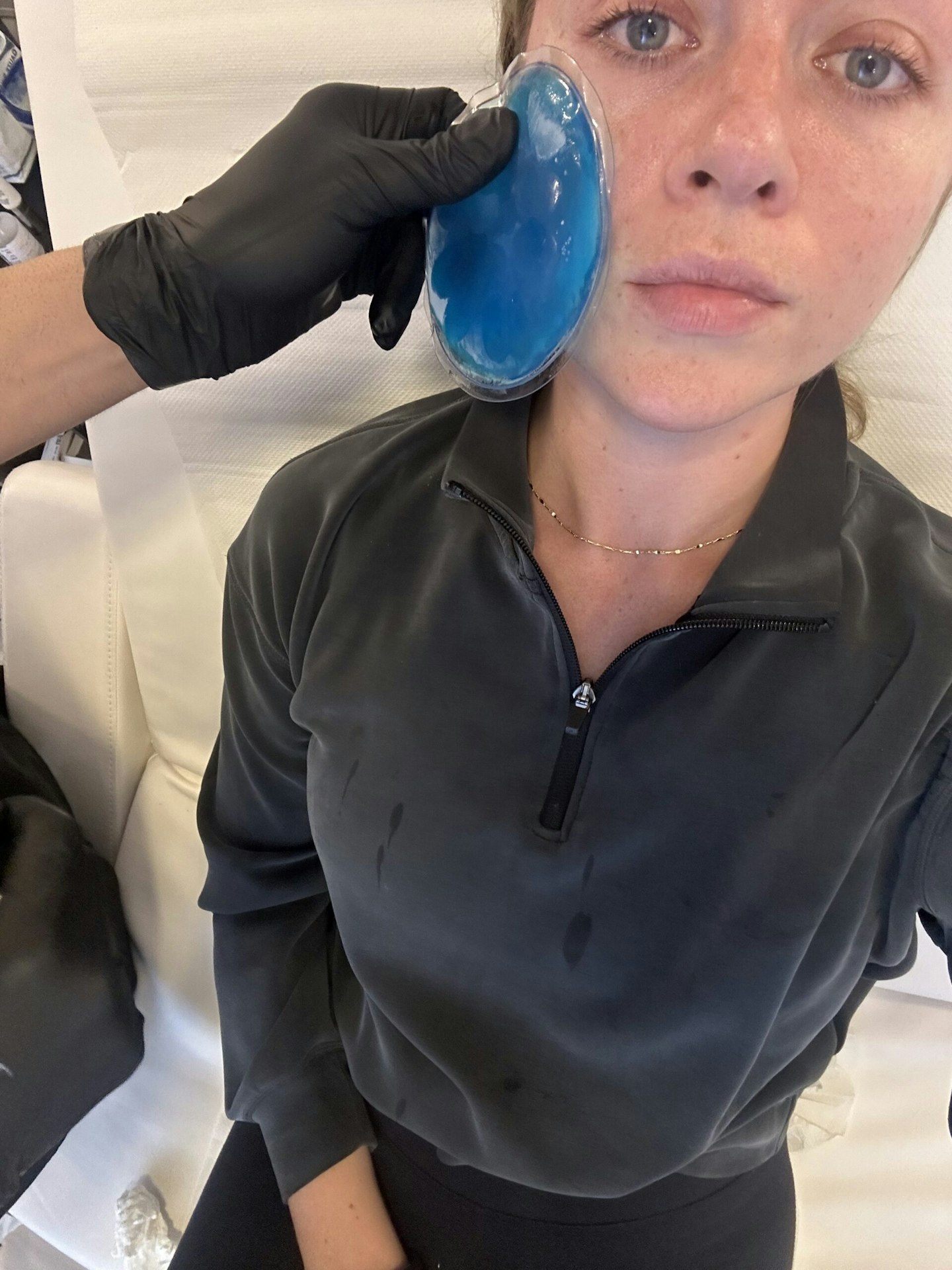
Dr Soni applied a local anaesthetic cream, then held an ice pack to the area meaning I was pretty numbed up by the time it came to administer the treatment
Results and Potential Side Effects
How long does it take to see results from polynucleotides? And how many polynucleotides sessions might you need? Dr Soni explains that, although you'll likely see results quite quickly after the first session, it's the second session that really 'kick starts that remodelling process.'
'The product continues to work for the first 12 weeks, so it continues to improve with time,' he says. 'However, you do get an improvement and lift early on. I would say that patients need 2-3 sessions, spaced out by roughly 2-4 weeks.'
Where side effects are concerned patients may see slight swelling or bruising. If in doubt? Don't be afraid to contact your doctor for further advice. 'I always check in with my patients afterwards to ensure everything is looking as it should,' he tells me.
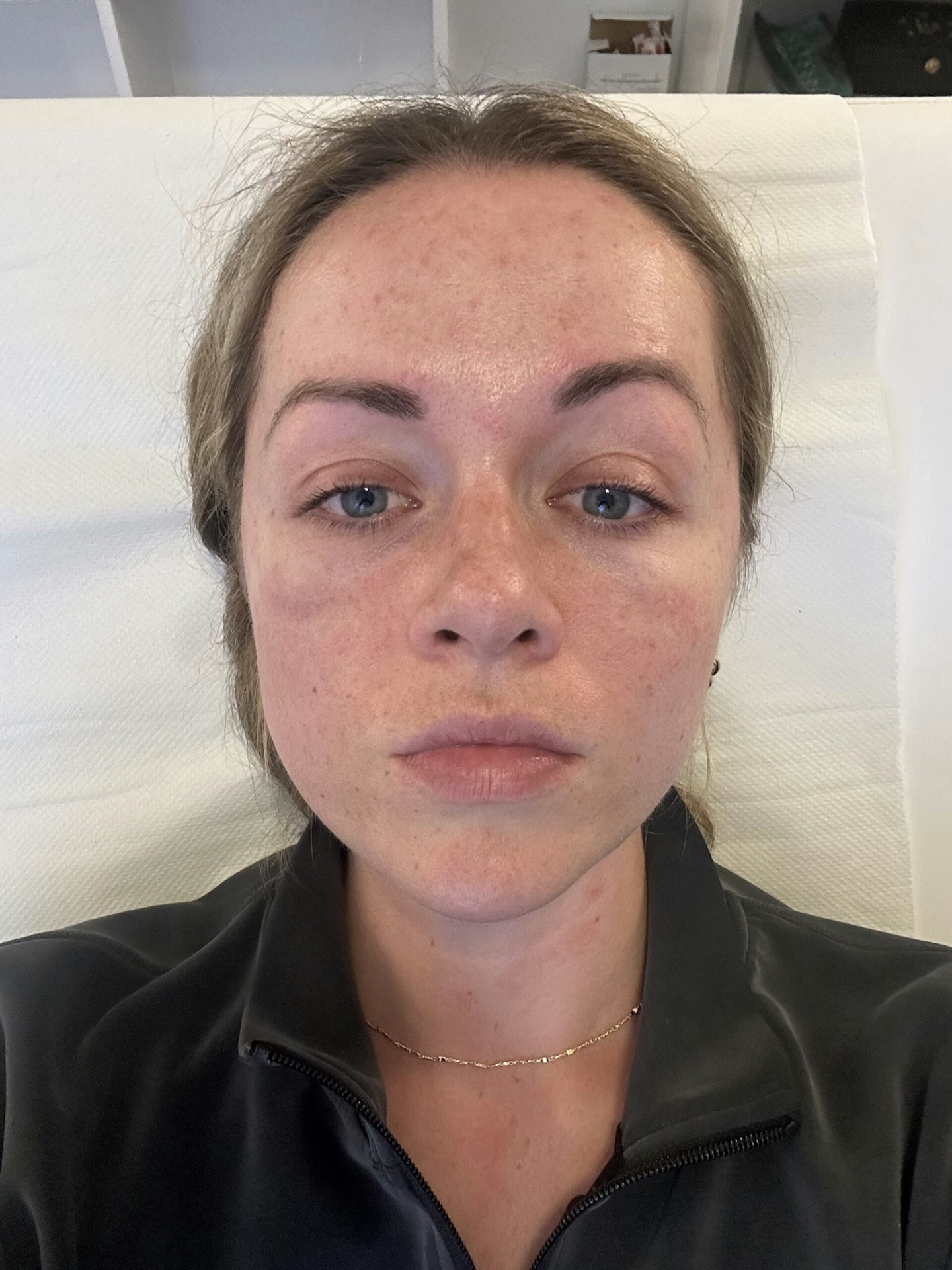
Immediately after my first polynucleotides session
I went on to have a further two treatments, spaced out over six weeks in total. After my initial polynucleotide session I did see swelling and I did bruise slightly under one eye - a reminder that, no matter how gentle your injector, you should never book in for a treatment too close to an important event. While I didn't bruise for either of the remaining treatments I did swell each time - but this didn't last for more than a day. In terms of results, I struggled to see anything tangible after the first treatment, but I did see a decided brightness in my under eye area after my second session. And after the third session the improvement was undeniable. While the difference might be a subtle one, that's exactly what I'd hoped to achieve. I wanted to look like a more well-rested, glowy version of myself without the need for anything permanent like fillers. And I do believe polynucleotides achieved this. My eye area looked brighter, less hollow and there was a definite softening of my fine lines. And, Dr Soni assures me, this will only improve as the weeks continue.
Polynucleotides: Before and After Photos
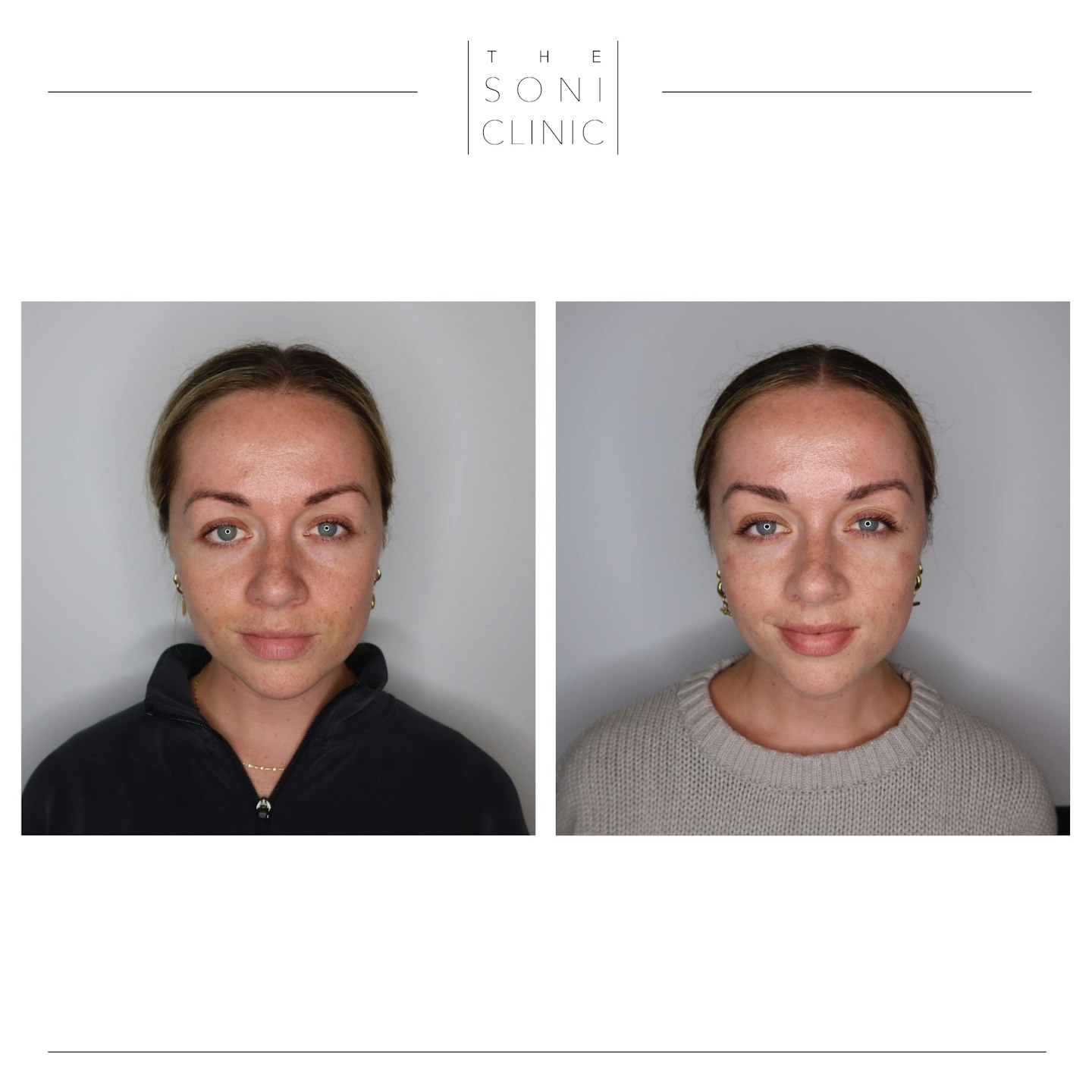
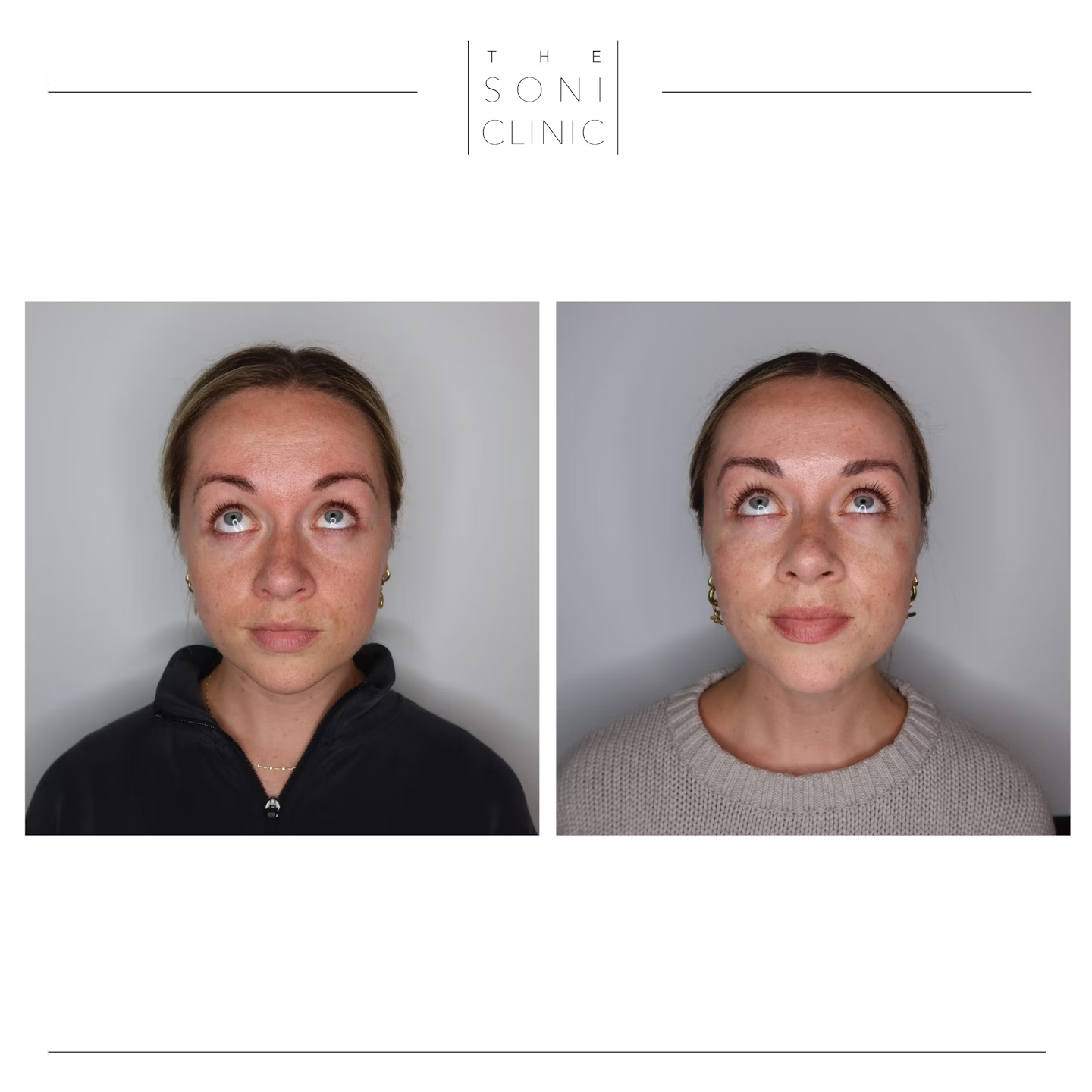
How long do polynucleotides last?
Patients can expect the results of their polynucleotide treatment to last for around six-seven months before booking in for a top up session.
Is anyone unsuitable for polynucleotide injections?
As aforementioned, polynucleotides are suitable for most patients, aside from those who are pregnant or breastfeeding. As it is an animal derived product it's important to note that it isn't suitable for vegans or those with a fish allergy.
'A thorough health history should also be taken prior to any procedure being performed,' adds Dr Soni. 'This will screen for psychological disorders or red flags before any aesthetic treatments.'
Choosing an injector: Dr Soni advises
Research: 'Research your chosen practitioner very carefully, and ensure you know their training, experience, and how long they have been doing this for. Search the General Medical Council Register if they are a doctor, and make sure that they have a full licence to practice in the UK.'
Ask for before and afters: 'You want to also see before and after photographs, and make sure you would be happy looking like that.'
Trust: 'Make sure that at the time of the consultation, you feel as though you can trust that provider, because this is your face. Do not go simply go based on cost, or social media following, because this does not correlate with experience. High quality practitioners using the best quality products will cost, but it is worth it, I assure you!'
Polynucleotides: The Aftercare
Ice: 'Icing the area when you get home will take down any swelling'.
Elevate: Use a second pillow to elevate your head when you sleep for a couple of nights to help with any mild swelling.
Rest: 'I tell patients to avoid intense gyming for 48 hours afterward to the treatment settle.'
Cost
How much does a polynucleotide treatment cost? Typically a polynucleotide treatment ranges between £500 and £800 per session with a top provider in London.
Rachael Martin is Grazia’s Beauty Editor where she covers all things beauty, health and wellness.
